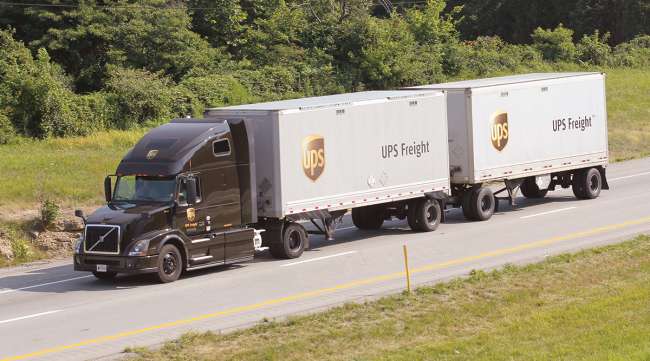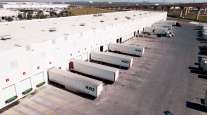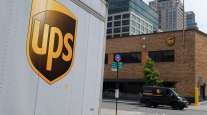Senior Reporter
UPS Q1 Revenue Rises, Net Income Dips

[Stay on top of transportation news: Get TTNews in your inbox.]
UPS Inc. on April 28 reported an increase in first-quarter revenue but said the COVID-19 pandemic caused a shift in its business mix that affected its bottom line result.
The company said Q1 net income fell to $965 million or $1.11 per share, compared with $1.11 billion, or $1.28 per share, in the same period last year. However, Q1 revenue rose 5.4% to $18.03 billion, compared with $17.16 billion a year ago.
“Net income included material headwinds due to disruptions from the coronavirus pandemic, higher self-insurance accruals and other items,” the company said in a release.
While the per-share earnings number fell short of the $1.23 expectation of analysts polled by Yahoo Finance, the revenue number outpaced analysts’ consensus estimate of $17.2 billion.
.@UPS Releases 1Q 2020 #Earnings - https://t.co/3bOLV49ioF #upsnews pic.twitter.com/8fqQjBp2XJ — UPS News (@UPS_News) April 28, 2020
In its U.S. domestic segment, UPS said revenue increased 9.3% to $11.45 billion compared with $10.48 billion a year ago, but operating profit fell to $364 million compared with $666 million.
“The progression of stay-at-home restrictions instituted across the country as a result of coronavirus closed businesses and disrupted supply chains, resulting in an unprecedented shift in customer and product mix in the quarter,” the company said of its domestic operations. While it noted that automated hubs and other “transformation investments” generated efficiency gains, they were not enough to offset what it called “significant headwinds from the impact the coronavirus pandemic had on UPS customers.”
The company’s supply chain and freight segment saw Q1 revenue dip less than 1%, to $3.19 billion from $3.21 billion, while operating profit slid 21.5% to $157 billion from $200 billion. UPS noted that its UPS Freight and Coyote Logistics businesses toward the end of the quarter experienced “depressed volume levels” due mostly to the stay-at-home orders and business closures. It also said the supply chain and freight division’s overall revenue was “negatively impacted by widespread reductions in global economic activity.”

Abney
“Over my 46-year career at UPS, I have never seen the level of demand variability in the markets that we serve and among our customers that we are now experiencing,” CEO David Abney said during a conference call with investors and analysts. “We are seeing a dramatic shift in consumer shopping behavior. By late March, residential deliveries approached nearly 70% of our volume and drove increased delivery costs, a trend we are seeing continue in April.”
Internationally, UPS saw Q1 revenue decline 2% to $3.38 billion from $3.45 billion a year ago, but net income rose 4.4% to $551 million from $528 million in 2019. UPS said international profitability was helped by China, which began to rebound in March after declining in January and February. Still, the company said overall international average daily volume was down 1.8% due in part to declines in commercial deliveries.
“This is a great example of the need to show agility in a changing work environment, and this is a very dynamic environment,” Abney said. “Many of us when we were kids played musical chairs — in this case, we have to play musical airplanes. We are having to move these aircraft — spur of the moment, very quickly making these decisions — and I’m just absolutely proud of the way we have been able to do that. But it’s not stopping for a while. It’s going to continue to be that way, and we just have to be responsive to the needs of our customers, and we will continue to do so.”
Like other companies, UPS is withdrawing its previously issued 2020 revenue and per-share earnings guidance. It also expects to cut its 2020 capital expenditures by as much as $1 billion and is suspending $783 million in planned share repurchases for the year.
“At this time, UPS is unable to predict the extent of the business impact or the duration of the coronavirus pandemic, or reasonably estimate its operating performance in future quarters,” the company said, noting that these steps will help it remain “strong and resilient throughout this period.”
UPS Chief Financial Officer Brian Newman added, “We will continue to adapt through this challenging period and prioritize investments and operational decisions that put UPS in the best financial position.”
The earnings call was the last for retiring CEO David Abney, who will hand the reins over to former Home Depot chief financial officer and longtime UPS board member Carol Tomé on June 1.
“I am absolutely confident you will be in great hands with her,” Abney said of his successor.
UPS ranks No. 1 on the Transport Topics Top 100 list of the largest for-hire carriers in North America and No. 2 on the TT Top 50 list of the largest logistics companies.
Want more news? Listen to today's daily briefing:




